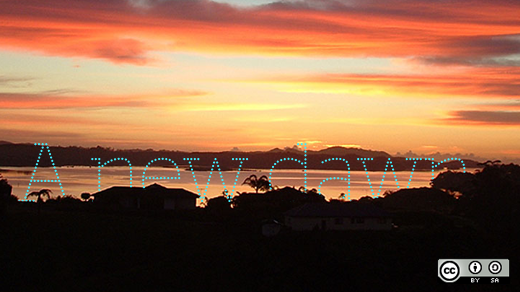Recently I returned to using a Linux desktop as my primary computing platform, and with that came LibreOffice as part of the default setup. I've been an OpenOffice user for almost a dozen years, but I knew that LibreOffice forked from OpenOffice in 2010. I decided to give LibreOffice a try and I loved it.
I wanted to find out more about the project, so I mentioned this to Rikki Endsley who helped me get in touch with Florian Effenberger, executive director of The Document Foundation, who in turn referred me to Italo Vignoli. Italo has over 30 years of experience in marketing and communication for high-tech companies in Italy and at international level. He was a founder of The Document Foundation and has worked for them since 2013. Italo graciously agreed to this interview.

Tell us about yourself and your work with open source.
I have been working in IT marketing and communications since 1981. Since 1987 I've been a professional consultant, working for several of the largest software vendors, such as Adobe and Macromedia, and hardware vendors, such as Apple and Dell. In general, I have a proprietary software/hardware background.
In the late '90s, I started to look around for a MS Office replacement. I was fed-up with the monopoly and really wanted to avoid using Outlook. After several experiences with MS Office clones, I stumbled upon the OpenOffice project in 2002, which showed a huge potential but lacked any marketing. In 2004, I started to volunteer inside the marketing and Italian native language projects.
In 2010, I contributed to the launch of The Document Foundation and LibreOffice, and I was a member of the board of directors from 2010-14. I have also launched the Certification Project, and I am now in charge of Marketing and PR.
How long have you been with the LibreOffice project?
I have been with LibreOffice since the first informal meeting in early 2010 to launch the project. I drafted the very first marketing strategy, which has been implemented in 2010-11, and then revised and updated it several times to reflect the evolution of the project.
I love this quote on your website:
"We believe that users should have the freedom to run, copy, distribute, study, change and improve the software that we distribute. While we do offer no-cost downloads of the LibreOffice suite of programs, Free Software is first and foremost a matter of liberty, not price. We campaign for these freedoms because we believe that everyone deserves them."
LibreOffice is one of the most successful free software projects ever, and is the first project that many PC users encounter while looking for an alternative to MS Office. Because of this peculiar situation, we have the responsibility to educate all LibreOffice users on free software. The sentence on our website reflects the Free Software ethos we are proud of.
How does LibreOffice and The Document Foundation support itself?
The Document Foundation is supported by a large number of individual donations from LibreOffice users, and by the fees paid by companies sitting on the advisory board. Donations represent around 90% of our resources.
In addition, there is a huge amount of volunteer work. Directors and most other officers are volunteers. Even paid officers are involved in a large amount of volunteer work. For instance, I am paid for marketing and PR activities, but I handle all activities in Italy as a volunteer (we're talking about several hours per week, and many weekends).
Of course, many of the development activities are paid by companies, either because they invest on free software or because they are paid by large end-users deploying LibreOffice on thousands of PCs to develop new features or solve bugs and regressions.
You have a significant presence on YouTube, which looks like it is mostly for training. How much does social media factor into getting the word out about LibreOffice?
We use social media within our marketing and communication strategy. Twitter and Facebook are the two most obvious choices, but we also have active Google+ communities in some places like Italy. We also have a blog, where we publish our press releases and all other announcements. Communication is key for a free software project because there is a huge information and education gap versus proprietary software, which can only be solved by engaging users where they are socially active.
I noticed on your blog that you have a viewer app for Android? Is there a similar one for iOS?
Before looking at iOS, we must provide a full-feature app on Android. On the other hand, there are iOS apps for reading and editing ODF files developed by independent software vendors. We do not endorse any of these applications, but we know that many LibreOffice users on the desktop rely on them for managing ODF files.
How many people are on your development team? How many developers do you have worldwide?
According to data from OpenHub, LibreOffice has close to 300 developers active on a yearly basis out of a community of over 900 developers who have provided from one to several thousand patches since September 28, 2010. The project has been able to attract at least three new developers for 56 months in a row, which represents quite an achievements for a free software project.
I've been using OpenOffice and now LibreOffice for almost 10 years. What are your future plans? Where do you see the project heading in the short term? The long term?
LibreOffice has a time-based release schedule, with two major releases per year at the end of January and July. Because of this time-based release schedule, we have something new every six months, and we do not have real "breakthrough" releases like other applications.
In general terms, developers are working at improving interoperability with MS Office—which is both a short-term and a long-term objective—and improving the look and feel (although we will never see something similar to MS Office ribbon). In addition, they are adding features requested—and paid for—by large customers.
Developers are also working at improving the LibreOffice app for Android and developing LibreOffice Online (announced for release in early 2016). In the long term, LibreOffice will become a line of products, capable of offering the same features on several platforms: desktop, mobile, and cloud.
Is there anything else that you would like to mention that I have failed to ask you about?
A personal note about a feeling shared by all the founders: When we announced the project on September 28, 2010, we were betting on our dreams. After five years, we face the strong reality of a successful free software project.
It has been exhausting, but also incredibly rewarding. This is one of those unique experiences worth living that gives a special flavor to life.






6 Comments